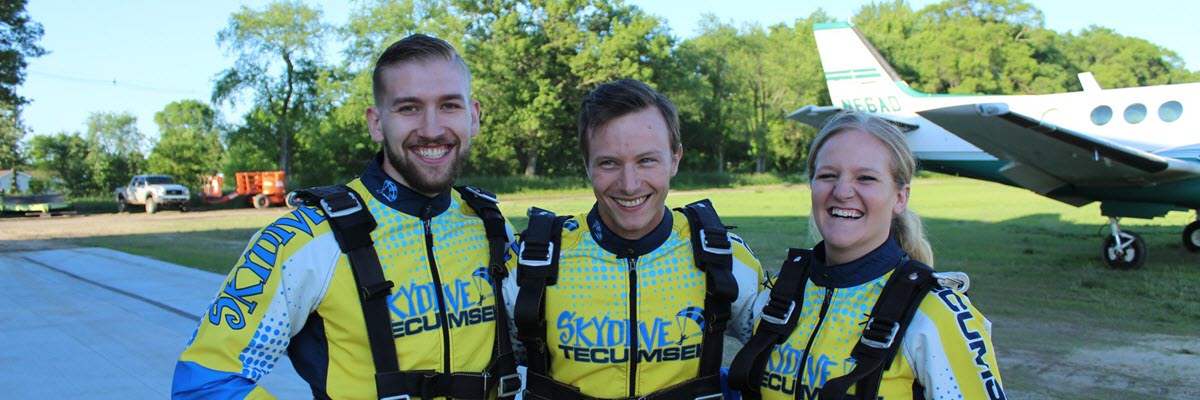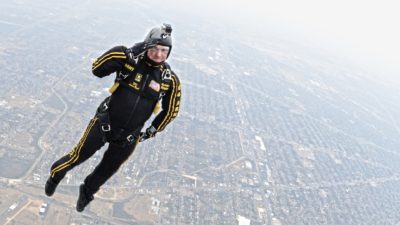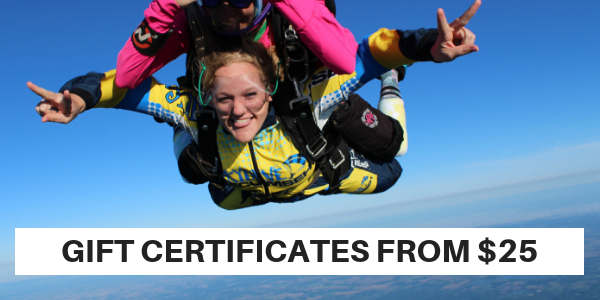- Michigan's Premier Skydiving Center
- Call Now: (517) 423-7720

Skydiving License Levels & Requirements Explained
Friday, June 21, 2024
- Skydive Tecumseh
- 6/21/24
- 0
- General
Skydiving is one of the best things since sliced bread – who are we kidding? It’s waayyyy better! It offers adventurers the thrill of freefalling through the sky while gaining a sense of confidence and a lifelong change in perspective. What’s better than that?
However, to ensure a successful skydive, skydivers must be proficient in all things skydiving. From how to operate the skydiving gear, fly the parachute, land the parachute, how to fly their bodies safely, and more! Solo skydivers must progress through various skydiving levels, each with its own set of requirements and privileges. This comprehensive guide will help you understand the different types of skydiving licenses, what you can do with each license, and how to advance through the ranks.
Skydiving License Levels
Most, if not all, reputable skydiving centers (like Skydive Tecumseh) are members of the United States Parachute Association  (USPA). The USPA issues four skydiving licenses: A, B, C, and D. Each of these skydiving certification levels indicates a skydiver’s experience, skills, and knowledge. Skydivers can use these certifications to jump at other dropzones around the U.S. and sometimes even outside of the country. How cool!
(USPA). The USPA issues four skydiving licenses: A, B, C, and D. Each of these skydiving certification levels indicates a skydiver’s experience, skills, and knowledge. Skydivers can use these certifications to jump at other dropzones around the U.S. and sometimes even outside of the country. How cool!
Skydiving A License
The first license you can attain is the USPA A license, marking your entry into the skydiving world. A-license skydiving allows you to jump totally solo or with a group of other licensed skydivers. You’ll be able to pack your own main parachute, engage in basic group jumps, and perform water jumps. To perform a solo skydive at any dropzone, you’ll be required to prove your knowledge and skills by showing your A license card/number, which the USPA will assign after proper application completion.
Skydiving B License
The skydiving B license is the next stage of skydiving. Obtaining a B license allows you to perform night jumps, high-altitude jumps, helicopter, and even hot air balloon jumps! Additionally, once you reach 100 jumps as a B-licensed skydiver, you will have the option to receive proper training to become a skydiving coach and teach other new jumpers how to progress in the sport!
Skydiving C License
The skydiving C license is the next step up after achieving your B license. Having a C license permits you to jump while wearing a camera. So instead of talking about the cool jump you did last weekend, you can actually show your friends and family!
A C-licensed skydiver is eligible to apply for the USPA Instructor rating (except Tandem Instructor), participate in demonstration jumps, and may ride as a passenger on USPA Tandem Instructor training and rating renewal jumps. Another perk of being a C-licensed skydiver is that it is usually one of the requirements for getting into wingsuiting or BASE jumping (if you’re interested in that sort of thing).
Skydiving D License
 The skydiving D license is the most advanced skydiving license you can achieve. D-license holders can apply for ALL instructor ratings provided by the USPA, including PRO ratings and the ability to jump into stadiums! Don’t worry, your skydiving journey doesn’t have to stop there. There are many types of skydiving disciplines that you can get into from there and perfect your skills even further.
The skydiving D license is the most advanced skydiving license you can achieve. D-license holders can apply for ALL instructor ratings provided by the USPA, including PRO ratings and the ability to jump into stadiums! Don’t worry, your skydiving journey doesn’t have to stop there. There are many types of skydiving disciplines that you can get into from there and perfect your skills even further.
Skydiving License Requirements
Skydiving license requirements are a set of criteria established by the USPA and the dropzone to ensure that skydivers possess the necessary skills, knowledge, and experience to jump as safely as possible. These requirements vary for each of the four license levels, progressing from basic competencies to advanced expertise.
To achieve these licenses, you must complete a specified number of jumps, demonstrate proficiency in essential skills, and pass written/oral exams. Skydivers of all experience levels are urged to practice regularly, stay informed, set goals, stay fit, and most importantly, seek mentorship from other experienced skydivers/instructors to gain insights and tips. Achieving each license level demands significant dedication, as licensed jumpers invest countless hours in practice, training, and continuous learning to master the art and safety of skydiving.
Skydiving A License Requirements
To earn an A license, you must:
- Complete a minimum of 25 jumps
- Successfully complete all requirements of the USPA A License Proficiency Card
- Complete 5 group freefall skydives involving at least 2 participants
- Receive the signature and official A license stamp on the USPA A License Proficiency Card (within the 60-day time limit following completion)
- Pass the USPA A license written and oral exams
Skydiving B License Requirements
To earn a B license, you must:
- Meet all current requirements for or hold a USPA A license
- Complete 50 jumps
- Land within 33 feet of the target center on 10 jumps
- Successfully complete planned formation(s) on 10 skydives (involving at least three participants)
- Document live water landing training
- Complete all of the requirements listed on the USPA Canopy Piloting Proficiency Card
- Pass the written USPA B license exam
Skydiving C License Requirements
To earn a C license, you must:
- Meet all current requirements for or hold a USPA B license
- Complete 200 jumps
- Land within seven feet of the target center on 25 jumps
- Successfully complete 50 skydives with at least 10 involving at least 4 participants
- Pass the written USPA C license exam
Skydiving D License Requirements
To earn a D license, you must:
- Meet all current requirements for or hold a USPA C license
- Complete 500 jumps
- Complete at least 2 of the following skill requirements:
- Night jump
- Land within 7 feet of target center on 100 jumps
- Participate in a canopy formation of a 3-stack or larger
- Complete an intentional water jump
- 100 skydives, with at least 25 involving at least 8 participants
- Pass the written USPA D license exam
How Much Does it Cost to Get Your Skydiving License at Skydive Tecumseh?
If you’re ready to get your skydiving A license, we offer a comprehensive Learn to Skydive program right here at Skydive Tecumseh! The journey to receiving your A license starts with booking ground school – a four to six-hour training course that solely takes place in our classroom – where you will learn everything you need to know to prepare for your first skydive. From there you’ll complete your first few jumps with our instructors by your side.
While you will have the option to pay-as-you-go, in total, you’ll spend about $3,500 for all 25 required jumps, training, and ground school. The good thing is that the price per jump decreases as you progress through the program, and once you’re a licensed skydiver, it’s only $34 to jump!
| Option | Includes | Price |
| Ground School & AFF Level I | Training Course, First Jump & Gear | $399 |
| Category B | Training, Jump & Gear | $249 |
| Category C1 | Training, Jump & Gear | $249 |
| Category C2 | Training, Jump & Gear | $239 |
| Category D1 | Training, Jump & Gear | $239 |
| Category D2 | Training, Jump & Gear | $239 |
| Category E | Training, Jump & Gear | $239 |
| Coaching Jump (~6) | Training, Jump & Gear | $175 |
| Self Supervised Jump (~12) | Jump & Gear | $85 |
Ready to fly solo? Book your AFF Ground School with us at Skydive Tecumseh to get one step closer to achieving your skydiving A license! Blue skies.
Copyright © 2025, Skydive Tecumseh, All Rights Reserved.
DropZone Web Design & Marketing by Beyond Marketing, LLC
